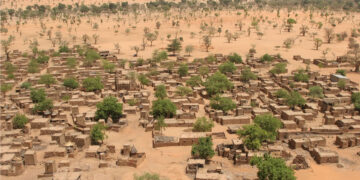Top officials from the African Union and United Nations issued urgent warnings on Tuesday about Africa’s accelerating desertification crisis, calling for immediate action to prevent ecological collapse and climate catastrophe.
The stark assessments came during the AU’s Great Green Wall Initiative experts’ meeting in Ethiopia’s capital, where delegates painted a dire picture of the continent’s shrinking arable land.
Pan African Climate Justice Alliance Director, Mithika Mwenda, highlighted the alarming convergence of the Sahara and Kalahari deserts, which are expanding southward and northward respectively at unprecedented rates.
“This isn’t just about sand dunes advancing – we’re witnessing entire ecosystems vanishing, taking with them the livelihoods of millions,” Mwenda told attendees.
He directly linked the crisis to climate change, noting that degraded forests and wetlands are now emitting stored greenhouse gases instead of absorbing them.
The UN’s Louise Baker delivered equally sobering remarks, revealing that Africa has lost over 50 million hectares of fertile land since 2000 due to unsustainable agricultural practices and deforestation.
“Our consumption patterns are literally eating away at the continent’s future,” Baker warned, displaying satellite images showing the dramatic retreat of vegetation across the Sahel.
AU Blue Economy Director, Harsen Nyambe, provided on-the-ground context, explaining how degraded soils have intensified drought cycles. “Where crops once grew, now only dust blows,” Nyambe told journalists, describing villages in Mali and Niger being swallowed by advancing desert sands.
He emphasised that the crisis disproportionately affects women and children, who typically bear responsibility for water collection in increasingly arid regions.
Discussions centred on revitalising the ambitious Great Green Wall Initiative, a 15-year-old project to create an 8,000-kilometre mosaic of restored ecosystems across the Sahel. While the programme has restored nearly 20 million hectares to date – about 15% of its 2030 goal – delegates stressed the need for accelerated funding and implementation.
New commitments were made to scale up community-based land management practices and drought-resistant agricultural techniques.
As the summit concluded, participants issued a joint call for industrialised nations to honour longstanding climate finance pledges, noting that Africa suffers disproportionately from environmental damage it contributed little to create.
With desertification now affecting 45% of Africa’s land area, the window for action is narrowing rapidly, Mwenda warned: “We’re not just fighting to reclaim land – we’re fighting for continental survival.”




































